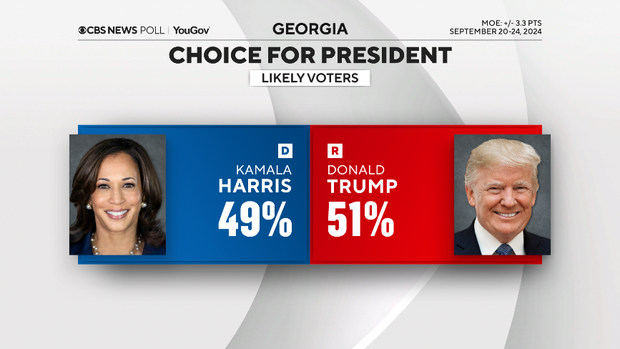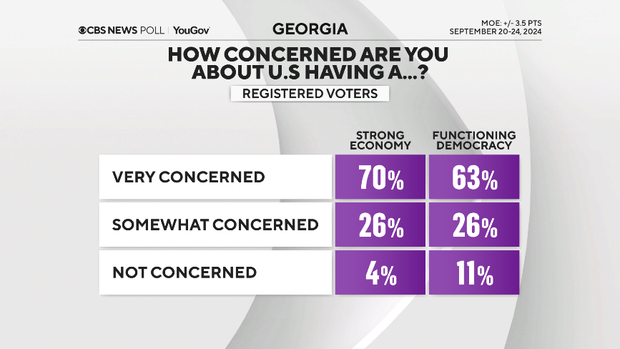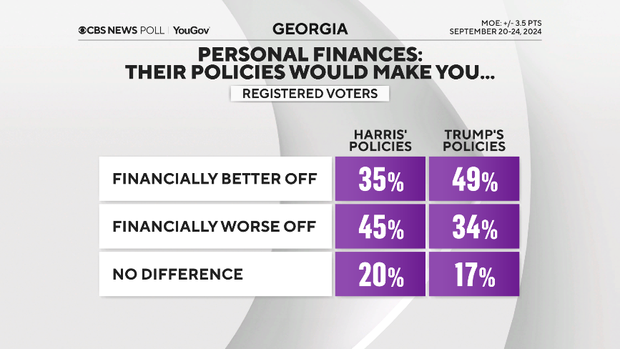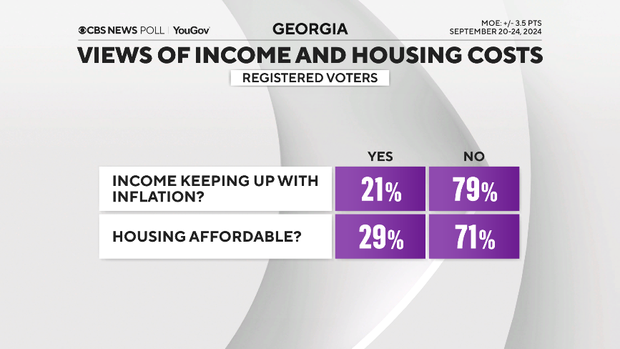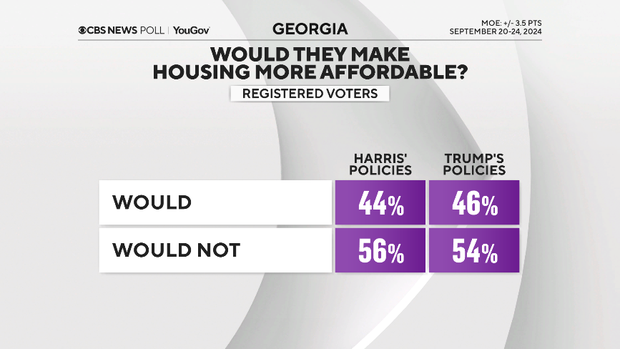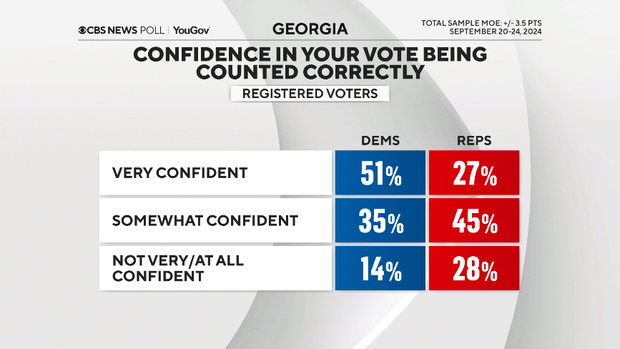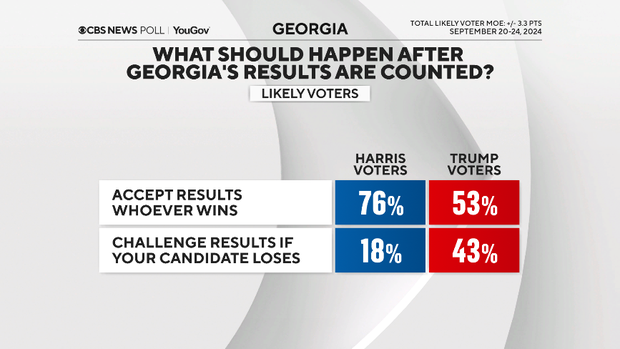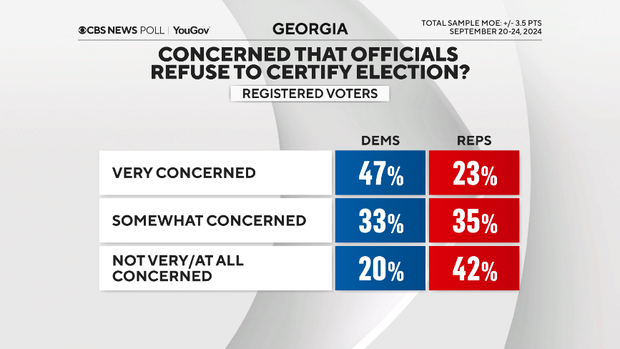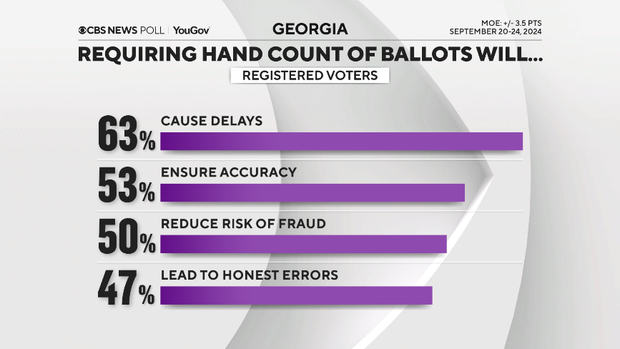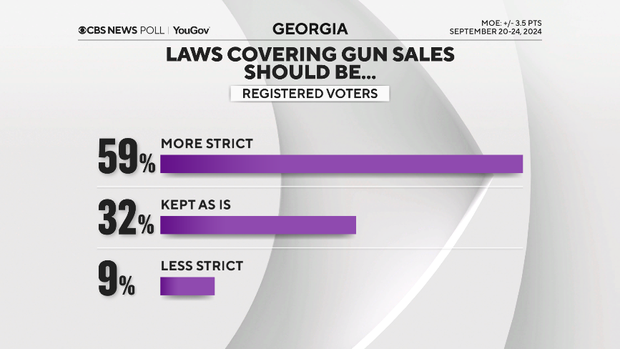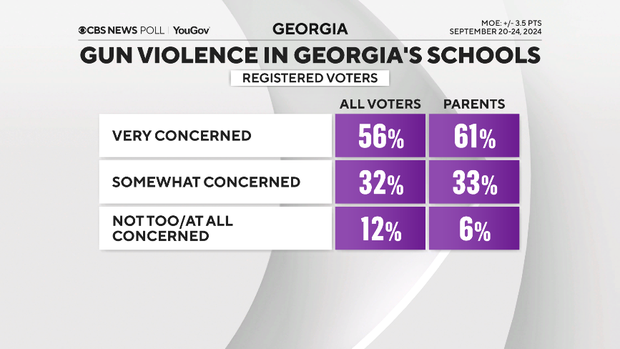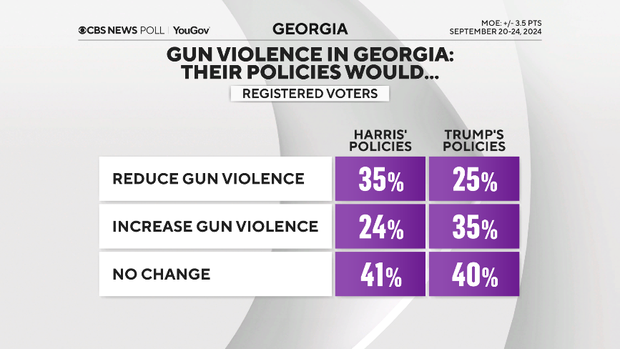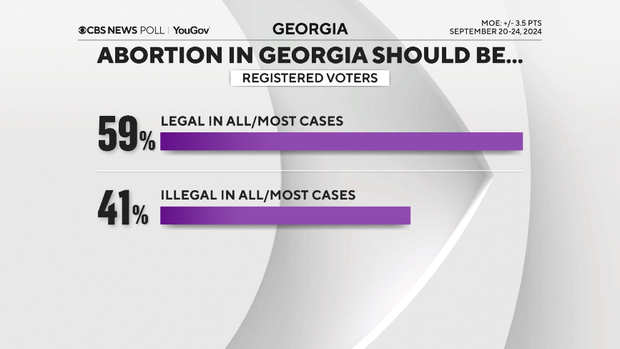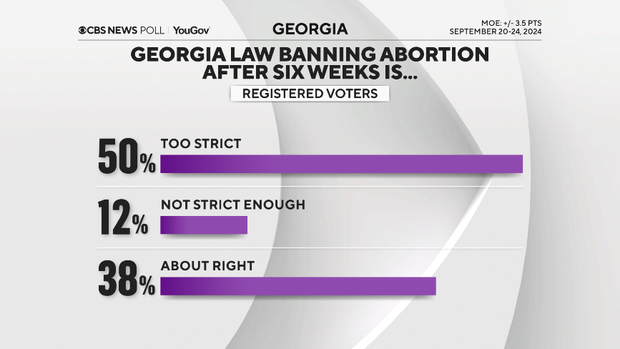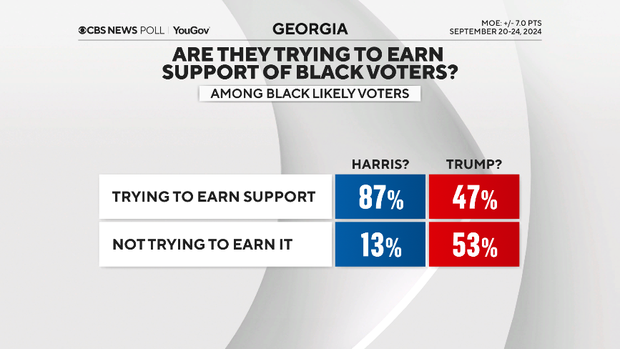It’s a toss-up race for Georgia’s 16 electoral votes. Four years after the state narrowly went blue for the first time in decades, the presidential race there remains tight. Donald Trump is currently at 51% in preferences of likely voters, with Kamala Harris just two points behind him.
Financial concerns continue to give Trump an advantage, but not to quite the same degree it did when Joe Biden was his opponent. Meanwhile, widespread concern about democracy keeps Harris competitive. Georgia’s voters are divided over recent actions by the State Election Board, and there are stark partisan divides in confidence in the election system, as well as in what should happen after the votes are counted in November.
Economy and finances
Many feel worse off financially than they were before the COVID pandemic. About half of registered voters in the state say Trump’s second-term policies would make them better off financially — similar to the number when we checked in this spring. Only a third say the same of Harris. While she trails Trump on this measure, it’s noticeably better than President Biden did in the state.
Rising costs are still a top concern across Georgia, with housing prices seen as particularly burdensome. Eight in 10 voters say their income isn’t keeping up with inflation, and seven in 10 say housing in their part of Georgia is unaffordable. On the latter issue, Harris and Trump are seen by roughly equal numbers as likely to help bring housing costs down.
Democracy and elections
As Georgia continues to deal with the aftermath of the 2020 election, most voters say the state of democracy is a major factor in their vote this year. While economic issues rank higher as a factor, most voters feel “very concerned” about whether the U.S. will have a functioning democracy when they think about the next few years. And this group is leaning toward Harris.
As far as elections in Georgia itself, Democrats are much more confident than Republicans that their votes will be counted correctly this year. Most Republicans continue to give credence to debunked claims of widespread fraud in 2020. Four in 10 Trump voters would prefer Georgia’s 2024 results be challenged and investigated if Harris wins after the votes are counted. Nearly all Republicans don’t view Mr. Biden’s win in 2020 as legitimate.
Democrats are more concerned than Republicans that some of Georgia’s election officials will refuse to certify the election results for political reasons.
The State Election Board recently voted to require election workers to hand count ballots on election night this November, in addition to a machine count. Most voters say this new rule will cause delays in finding out results. They are more split on whether it will ensure accuracy or reduce risk of fraud, with views heavily divided by partisanship.
Majorities of Democrats feel the board did this for political reasons and to deliberately interfere with the election process. Republicans by and large feel it was to ensure elections are secure.
Other issues: guns and abortion
Just a few weeks after the deadliest school shooting in state history, most voters say they are very concerned about the possibility of gun violence in schools. That’s especially true of parents in the state, and majorities across party lines are at least somewhat concerned.
Six in 10 say laws covering gun sales should be made more strict in Georgia. Harris has a bit of an advantage on the issue, but neither candidate gets many voters who say their policies would reduce gun violence in the state.
Most Georgia voters support legal abortion, but their views on the details are more complicated.
Six in 10 want abortion in Georgia to be legal in most or all cases. That majority includes a third of Republicans. However, fewer call Georgia’s current law banning most abortions after around six weeks of pregnancy, “too strict.” Only half of voters statewide say so, with four in 10 saying the law is about right.
And just under half say being pregnant in Georgia is becoming more dangerous since the overturn of Roe v. Wade. They are backing Harris over Trump by 4 to 1, while voters who don’t feel this way about being pregnant are the mirror image in their vote choice.
There’s agreement across party lines that Harris would try to pass national legislation making abortion legal, but voters divide on what Trump would do. Most Democrats say he would try to pass a national ban, while most Republicans say he would leave it to the states to decide.
Abortion and gun policy are more salient on the left than the right these days. In fact, they rate about as highly as the economy as major factors in the vote choice of Harris supporters.
About half of registered voters say Harris is more liberal than they would like her to be, a notch higher than the four in 10 who say Trump is too conservative. However, this flips among self-described moderates, who are more likely to see Trump as too conservative than Harris as too liberal.
Key voter groups
The Atlanta metro area and its diverse suburbs were key to Democrats’ statewide victories in 2020 and 2022. At the moment, Harris isn’t matching Mr. Biden’s 2020 support in these counties.
And while Black voters are backing her in large numbers, they aren’t doing so at quite the same rates they voted for Mr. Biden four years back. Harris does slightly better among Black women than Black men, and even a small increase in Black support for her would make the race dead even.
Nearly nine in 10 Black voters feel Harris is trying to earn the support of Black voters. Only about half say so of Trump — that number is down from this spring, when most felt he was.
Trump leads Georgia’s men by double digits, while Harris leads women more narrowly — that is producing a gender gap on par with what we saw in 2020.
There’s some room for movement in the electorate, but not a lot. About one in 10 likely voters in the state profile as persuadable, using a fairly broad definition of being unsure of one’s choice or willing to consider the other candidate. That means nine in 10 are locked into their choice, and even many of the persuadable will stick with the way they’re leaning now. That all points to the importance of turnout, including new registrations.
With mail balloting underway in Georgia, Democrats are poised to bank a small lead in the coming weeks. Their voters make up a majority of those who plan to vote by mail. In-person early voting, which begins in mid-October, remains the most popular way of casting a ballot in the state. And those who plan to vote this way divide evenly between Trump and Harris. More voters are set to vote on Election Day this year than did so in 2020, and as we saw back then, this group favors Trump by a wide margin.
Jennifer De Pinto and Fred Backus contributed to this report.
This CBS News/YouGov survey was conducted with a statewide representative sample of 1,441 registered voters in Georgia interviewed between September 20-24, 2024. The sample was weighted according to gender, age, race, education and geographic region, based on U.S. Census data and voter files, as well as to past vote. The margin of error for registered voters is ±3.5 points.

